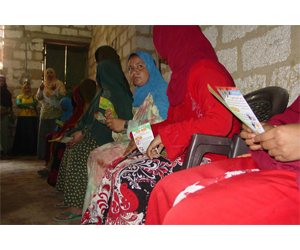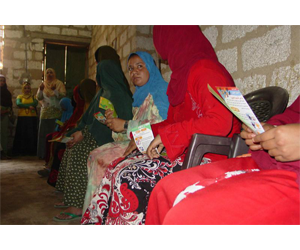Arab Women Speak Out (AWSO) is a communication initiative that, in the participatory development tradition of Paulo Freire (2000[1970]), seeks to enhance critical reflection and encourage action.
Below, Carol Underwood summarizes the stories of three women who participated in the program and the evidence about the effects of their participation.
Hamdia, Sabah, and Azziza, children in tow, awaited us in their small clothing shop, situated along a narrow, unpaved roadway in a village near Fayoum, Egypt. Dresses, tunics, slacks, and scarves cascaded down and across the walls, adding splashes of color and texture to the otherwise featureless walls.
The shop was the fruit of the three women’s participation in the program Arab Women Speak Out. Hamdia, 28 and married for 11 years, was proud of the business she had built with her friends, Sabah, 28, and Azizza, 31. dreamt of starting a business, but her husband refused to entertain the idea: He was the breadwinner and, he thought, she had more than enough to do with three young children and myriad household tasks. Even so, Hamdia told us, “I had a lot of spare time, life was boring.” So when volunteers stopped by her home three years ago to invite to her take part in the program Arab Women Speak Out, she was intrigued.
Before the first session ended, Hamida, her friend, Sabah, 28, and a new acquaintance, Azizza, 31, had begun, if only inchoately, to question the worldview that constrained their lives and foreshortened their horizons. Over the course of eight 2-hour sessions, the group facilitator challenged the participants to understand that they need not acquiesce to a life that left them feeling empty at the end of the day, but that by interrogating normative assumptions, including narrow gender constructs, and purposively planning for action, they could augment their opportunities. Video portraits of Arab women who in appearance and life circumstances were indistinguishable from Hamida and her friends yet had overcome gender-based obstacles to become more active members of their communities vivified the discussions and inspired the determination to act. During these sessions the women honed their critical thinking, decision-making and negotiating skills, thereby enhancing the likelihood they would take action—and succeed.
Within a year and half of their AWSO participation, the three women had gathered sufficient funds, convinced Azziza’s husband to turn his storefront over to them, and launched their business. Due to the program, the women noted, they have better incomes, enhanced self-confidence, the admiration of their husbands, and expanded social interactions. Sabah asserted, “AWSO gave us the power to change our lives.” Hamdia quickly concurred, as she said:
I had no goal, nothing to do, . . . and no value. But when I became productive, and was no longer only a consumer, many things changed. I became much happier as I tried to do something. And best of all, I have succeeded.
As we were about to leave the shop, I turned and asked the women if there was anything else they wanted to say about the AWSO experience. Hamdia looked at me with her dark, gentle eyes, her gaze unwavering, and in a voice of quiet dignity said simply, “I want to thank you for Arab Women Speak Out.”
Overcome by the emotion of the moment, I could barely mumble the Arabic for “You’re welcome” on behalf of all who had brought this program to life. The fundamentally life-changing effects of the program had, until that moment, been largely theoretical for me. The reality struck deeply.



